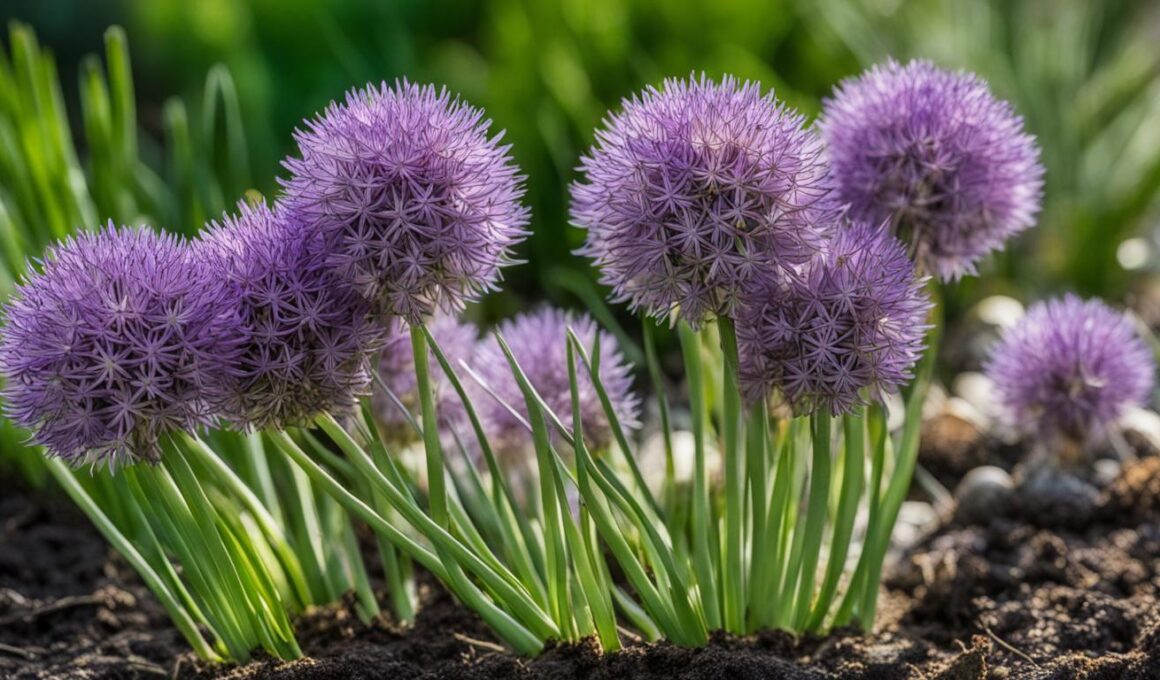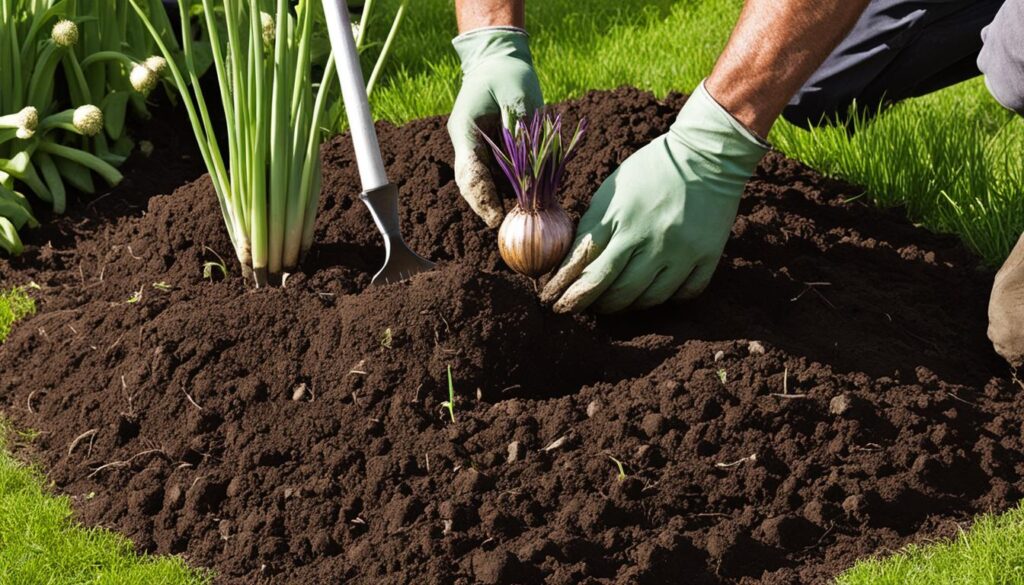Allium bulbs are a popular choice for gardeners looking to add color, height, and character to their beds and borders. These ornamental members of the onion family produce magnificent, pom-pom-like flowers that sit atop tall, single stems. Allium bulbs come in various colors, including purple, white, pink, and blue, and their spherical blooms add a delightful touch to any garden.
One of the benefits of growing allium bulbs is that they can multiply over time, creating a more abundant display. To propagate allium bulbs, gardeners can dig them up after the flowers have died back and divide the bulbs. The smaller bulbs can then be replanted in other areas of the garden or shared with friends.
Allium bulbs also provide continuous interest in the garden, as the seed heads that follow the flowers can be cut and dried indoors or left to add decorative appeal throughout the summer. Overall, allium bulbs are a low-maintenance option for gardeners who want to enjoy robust blooms year after year.
Planting and Caring for Allium Bulbs
Allium bulbs, with their stunning blooms and unique charm, require specific planting and care to ensure their healthy growth and multiplication. Whether you choose to plant them in pots or in the ground, the right conditions and maintenance are essential for their success in your garden.
Planting Allium Bulbs in the Ground
When planting allium bulbs in the ground, choose a sunny spot with well-drained soil. Allium bulbs thrive in full sun, so find an area that receives ample sunlight throughout the day. The soil should be well-drained to prevent waterlogging, which can lead to bulb rot.
Plant the allium bulbs at a depth of 2-3 times their size. Smaller bulbs should be spaced around 10cm apart, while larger varieties require a spacing of at least 20cm between bulbs. To improve drainage, consider adding a sprinkle of grit to the planting hole, especially if you have clay soil.
Caring for Allium Bulbs
Allium bulbs are relatively low-maintenance plants, but they still require some care to thrive. These bulbs are drought-tolerant and do not need much watering, except during a dry spell. However, if you choose to plant allium bulbs in pots, regular watering may be necessary to avoid waterlogged compost.
It is important to avoid overwatering allium bulbs, as this can lead to bulb rot. Allow the soil to dry out between waterings, and only water when necessary.
Deadheading allium plants is not necessary. The dried seed heads that follow the flowers provide visual interest and attract birds and insects, enhancing the beauty of your garden until the end of the season.
After flowering, allium bulbs can be left in the ground over winter. They are hardy plants that can withstand cold temperatures. However, if you have planted the bulbs in pots, it is recommended to move them to a sheltered spot to protect them from frost damage.
By following these planting and care tips, you can enjoy the beauty of allium bulbs in your garden year after year, adding a touch of elegance and intrigue to your outdoor space.
Planting Allium Bulbs: Timing and Tips
Allium bulbs are a wonderful addition to any garden, but proper timing and care are essential for their successful growth. When it comes to planting allium bulbs, timing is crucial to ensure optimal results.
In the United Kingdom, allium bulbs are available for sale from late summer through autumn, making this the ideal time for planting. Specifically, September to November is the best period to get your allium bulbs in the ground. However, if you have newer varieties like allium ‘Millenium’, you can plant them in early spring and enjoy their flowers from spring through to August.
When planting allium bulbs in pots, it’s important to choose a pot with drainage holes to prevent waterlogging. To improve drainage further, add crocks (broken pot shards) to the bottom of the pot before filling it with compost. Place the allium bulbs on the surface of the compost, spacing them approximately 10cm apart, and cover them with more compost. Finally, firm the surface gently and water the bulbs to ensure they are adequately hydrated.
If you prefer planting allium bulbs in the ground, you have a couple of options. You can either scatter the bulbs and plant them individually using a bulb planter or trowel. Alternatively, you can bed taller allium varieties in a sheltered spot to protect them from wind damage.
Regardless of the planting method, it’s crucial to ensure that the allium bulbs are planted at the correct depth. As a general rule, allium bulbs should be planted at a depth of four times their diameter. This ensures that they have the necessary soil coverage for healthy growth.
To further enhance drainage when using pots, you can use pot feet or bricks to elevate the pots slightly. This simple tip can help improve drainage and prevent water from pooling around the bulbs, reducing the risk of rot.
Remember, successful allium bulb planting requires careful attention to timing, as well as consideration for factors such as depth, pot feet, and drainage. By following these tips, you can ensure that your allium bulbs thrive and provide a stunning display of beautiful blooms.
Conclusion
Allium bulbs are a fantastic addition to your garden, providing stunning blooms, easy care, and the ability to multiply over time. These ornamental members of the onion family can invigorate your garden beds and borders with their pom-pom-like flowers in various colors, including purple, white, pink, and blue.
Caring for allium bulbs is relatively straightforward. They thrive in full sun and well-drained soil, requiring minimal watering. You can enjoy their beautiful blooms year after year without the hassle of lifting them from the ground during winter. Additionally, the dried seed heads of allium bulbs continue to add aesthetic appeal to your garden throughout the summer.
With proper care and propagation, allium bulbs can create a more abundant and vibrant display, enhancing the beauty and charm of your garden. So, if you’re looking for an easy-care plant that brings color and elegance to your outdoor space, consider adding allium bulbs to your gardening repertoire. You won’t be disappointed with the stunning results year after year.
Will Planting Allium Bulbs Help Deter Maple Tree Helicopters?
Planting allium bulbs is a natural method for getting rid of maple helicopters. Allium’s strong smell repels many insects and pests, including the maple tree helicopters. By strategically planting allium bulbs around your property, you can help deter the pesky helicopters and keep your outdoor space clean and free.










